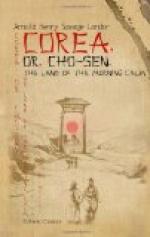Chemulpo’s origin is said to be as follows: The Japanese government, represented at Seoul by a very able and shrewd man called Hanabusa, had repeatedly urged the Corean king to open to Japanese trade a port somewhat nearer to the capital. Though the king was personally inclined to enter into friendly negotiations, there were many of the anti-foreign party who would not hear of the project; but such was the pressure brought to bear by the skilful Japanese, and so persuasive were the king’s arguments, that, after much pour-parleying, the latter finally gave way. Towards the end of 1880, the Mikado’s envoy, accompanied by a number of other officials, proceeded from the capital to the Imperatrice Gulf and selected an appropriate spot, on which to raise the now prosperous little concession, fixing that some distance from the native city. In course of years it grew bigger, and when I was at Chemulpo there was actually a Japanese village there, with its own Jap policemen, its tea-houses, two banks, the “Mitsui-bashi” and “The First National Bank of Japan,” and last but not least, a number of guechas, the graceful singers and posturing dancers of Nippon, without whom life is not worth living for the Nipponese.
Like the Australians generally, who begin building a town by marking out a fine race-course, so the light-hearted sons of the Mikado’s empire, when out colonising, begin as a first and necessary luxury of life by importing a few guechas who, with their quaint songs, enliven them in moments of despair, and send them into ecstasies at banquets and dinner-parties with their curious fan-dances, &c, just as our British music-hall frequenting youth raves over the last song and skirt-dance of the moment.
The guechas, mind you, are not bad girls. There is nothing wrong about them except that they are not always “quite right,” for they are well educated, and possess good manners. They are generally paid by the hour for the display of their talent, and the prices they command vary from the low sum of twenty sens (sixpence) to as much as two or three yen (dollars), for each sixty minutes, in proportion, of course, to their capacity and beauty.
As the New Year was fast approaching, and that is a great festivity among the Japanese, the guechas at Chemulpo were hard at work, and from morning till night and vice versa they were summoned from one house to the other to entertain with their—to European, ears excruciating—music on the Shamesens and Gokkins, while sake and foreign liquors were plentifully indulged in.




